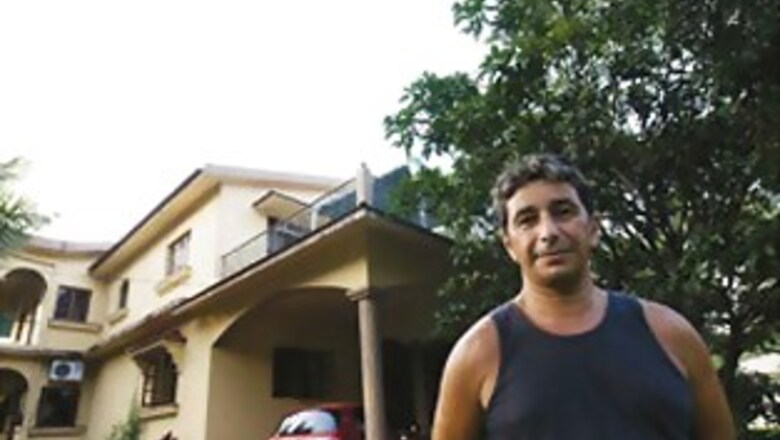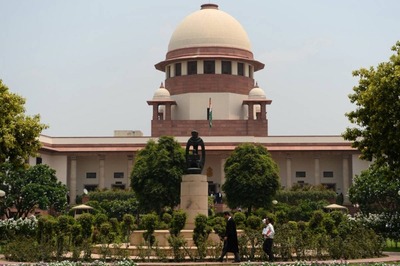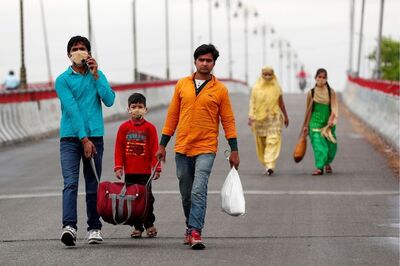
views
Last December, Nicholas Papa and Michael Cooper got an early Christmas present: A show cause notice from the Directorate of Enforcement (DoE). It carried two messages: Your home may soon be confiscated; you will be fined three times the land’s value.
Papa and Cooper (Nick and Mick, as they call themselves) moved to Goa from the UK nine years ago. In Aldona, a few kilometres from the beach, they bought a bungalow for Rs 30 lakh and spent another Rs 18 lakh renovating it, intending to retire there on Cooper’s pension fund. Under the stress of possibly losing their life savings and home, Cooper, 65, had a mental breakdown this January. “They want us to leave,” says Papa, “but won’t let us sell our house, won’t let us gift it. We gave up everything to come here, and now we will lose it all.”
More than 400 foreigners--mostly British--have received similar notices from the DoE.
Paradise lost
The story of Westerner’s choosing Goa as a place to settle down began when Western hippies first discovered Goa’s beaches. Certainly, laid-back North Goa lured many smitten visitors to set up home there. From 2000 to 2005, the number of foreign landowners swelled. Many were Britons who planned to retire there, on pension or dole money.
By 2004, land values--and tensions--were rising. Many foreigners opened profitable businesses; some foreigner-owned shacks started doing better than Goan ones. Christmas Eve 2004 saw a mob led by the sarpanch of Anjuna village in North Goa attack six foreign-owned restaurants, forcing them to close.
Come 2005, values had got so high that a land grab started. Indian developers (and not a few Russians) bought up land. Goans were priced out of the market. Activists feared that the ‘corporatist mafia’ would turn Goa into a concrete jungle. They would later call it “the rape of Goa.”
Author and Goa Bachao Abhiyan activist Venita Coehlo says that with the rise of drugs, prostitution, and other illegal activities, “A lot of resentment built up toward foreigners. The Goan is protesting the loss of his identity as he feels swamped by outsiders taking his land and his businesses.” A 2006 National Security Council Secretariat report on the investment of Russians and other foreigners in big tracts of lands prompted a state inquiry into why these lands were really being bought.
Many feel these crackdowns mask rampant corruption. At any rate, by 2006 the pressure on the government to save Goa--or line their own pockets, depending on who you believe --was at exploding point. It acted: Denotification of Regional Plan 2011 reverted a large number of residential zones to agricultural zones with retrospective affect. According to the Foreign Exchange Management Act, 1999 (FEMA), foreign landowners cannot buy agricultural land of any sort in India; violators can be penalised three times the value of their land and may have the property confiscated. Suddenly, many landowners became lawbreakers.
By the book
The show-cause notice Mick and Nick received lists three transgressions: Buying on a tourist visa; being non-residents; and buying agricultural land. Nick laughs bitterly and points to a two-foot-tall stack of documents he has saved. They have never lived in Goa on a tourist visa; they own resident permits; and they have the Sanad papers, showing that their land has been properly converted from agricultural to residential. (Sanad is a document required by Goa’s 1969 Land Revenue Code to change land). “Since 2006, I have felt that if you are white, you’re targetted based on the colour of your skin. They call us English bastards, and tell us to go home. We want to go home, but now we even can’t do that.”
For many who bought legally, getting the notices was traumatic. Nick and Mick tell us of one friend who just had a stroke, another who had a heart attack, a woman in Parra, near Calangute beach, who slit her wrists.
When asked why no action has been taken against Indian nationals in similar legal situations, former law minister Dayanand Narvekar objects: “Even the Goans will be sent notices. It is very unfortunate for these foreigners, but they should have taken the time to figure out the way to buy property legally in Goa.”
PAGE_BREAK
Mick and Nick have faced endless buck-passing. When they went to the Reserve Bank of India, they were passed on to the DoE. Who sent them back to the RBI. RBI rules state they cannot repatriate any money from the sale of their house. So they would have to exhaust the funds in India and go back to the UK with nothing.
At the end of it of all, they have both been told to just go to court. Nick and Mick estimate that a lawsuit will cost them at least Rs. 2.5 lakh; they are currently paying more than Rs 15,000 for each legal or accounting consultation.
Mick and Nick’s two-foot-stack of documents may help them win in court. Others won’t be so lucky.
The damned
With all that land up for grabs, it’s not surprising that scams abound — these often involve fake agents who do not give prospective property buyers the real picture on the ground. Author Sudeep Chakravarti, who lives in Goa and has written a book set against the backdrop of the state’s corruption, says the scams “happen at the builder, lawyer, agent, and government level. They are slowly being exposed, but they will keep on happening until there is no land left, I suppose.”
The issue is rampant in North Goa but matters are starting to unravel down South as well. In Quitol, a village in Quepem in South Goa, the government acquired large tracts of land two years ago, allegedly to build a food park. Goa Bachao Abhiyan found the land being advertised for mega projects and homes for UK tourists instead. “It’s absurd,” says Coehlo, “They are acting holier than thou, and pulling off an even bigger scam.”
And then, there are the ones who appear to have willingly skirted the law. Some got fake certificates. Others forged documents saying they were here for longer than 182 days--the number of days a foreigner needs to live in India to be eligible to buy land. But it’s not all cut-and-dried.
Take Russian landowner Leonid Beyzer, in the midst of a lawsuit over a 30,000 sq metre property in Morjim, North Goa. “The media had labelled him as head of the Russian mafia,” says Vikram Varma, an advocate who has taken on many of the foreign landowners’ cases and is Beyzer’s lawyer, “but that is not true. Beyzer’s property is now worth two million dollars, and there is clear evidence of criminals trying to usurp it.”
“There is a fair share of greed at the top, and they will keep doing this to make the money,” says Dakini Runningbear, a UK-based yoga teacher who uncovered clues in the infamous Scarlet Keeling case. Rajeev Samant founder/CEO of Sula Wines and long-time visitor to Goa, agrees: “Ultimately, if the government wants, they can pin anything on anyone.”
In purgatory
Three years after the Denotification of ‘Regional Plan 2011’ in Goa, there is no clear solution in sight. Goa’s Sub-Registrars are still instructed not to register deeds to foreigners. The DoE is still handing out notices. Yet a glimmer of hope exists. The British Foreign Office finally responded to two years of petitions, writing back in August that they had raised their concerns at both the union and state government level in India: “We have made clear our view that any new legislation...should not be retrospective and there should be no question of confiscation of property acquired legally.”
In late October, Vicki Treadell, British Deputy High Commissioner in Mumbai, met with a group of foreign landowners in Goa to hear their concerns. She took those concerns to Goa’s Chief Secretary, and Chief Minister Digambar Kamat: “They are looking into the matter. He has heard the message.”
When this reporter went to an appointment with Kamat, he said, “I cannot talk about this now.” Law minister Narvekar says, “I feel sorry for them, I hope something can be worked out.” Karen, another foreign landowner who has been refused the deeds to her Rs 23 lakh property, is cynical: The Chief Minister is a large builder; she is sure there are no intentions of helping them.
If, indeed, the politicians are seeking a solution, the foreign landowners can do little but wait; they cannot sell or give away their property, or move out. Treadell says, “Many are frightened by unscrupulous people telling them to get out and cut their losses. They don’t know whether to do this or wait. And many of these are the elderly.” Some aren’t content to just wait; they’re joining hands to fight a class action suit.
Builders and developers are still aggressively advertising to foreigners, but finding few takers. For the more than 500 foreign landowners who have or will receive notices, Varma, the advocate, says the legal process which may end in confiscation is close to completion.
Michael Lobo, director of Homes and Estates Consultancy Services, is sure that nothing will happen. “The government doesn’t want to take action, because if they allow or disallow it they will be nailed. It will remain the status quo.”
For Mick, Nick, Karen, and hundreds of others, this means that regaining paradise is just a dream.




















Comments
0 comment